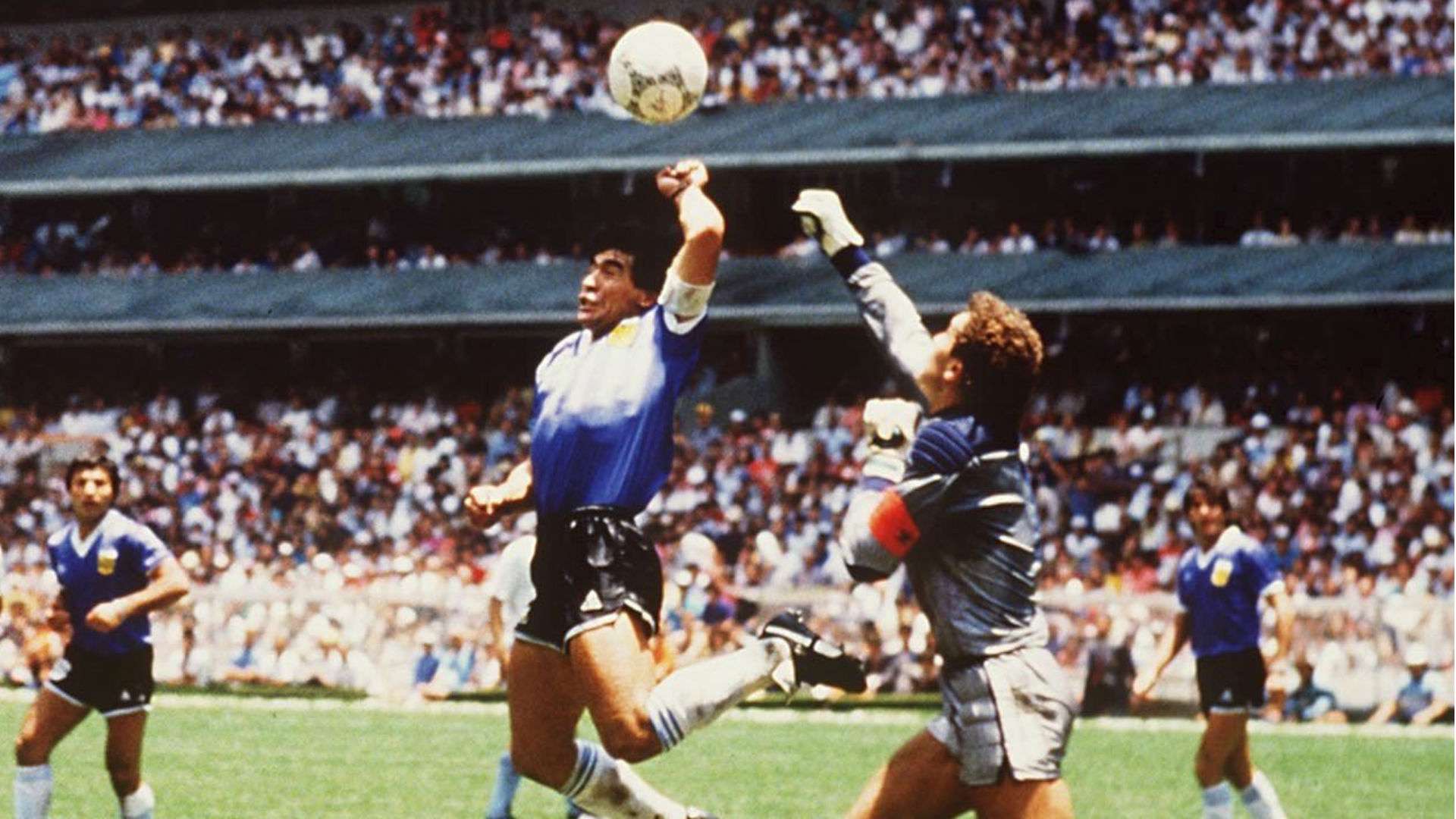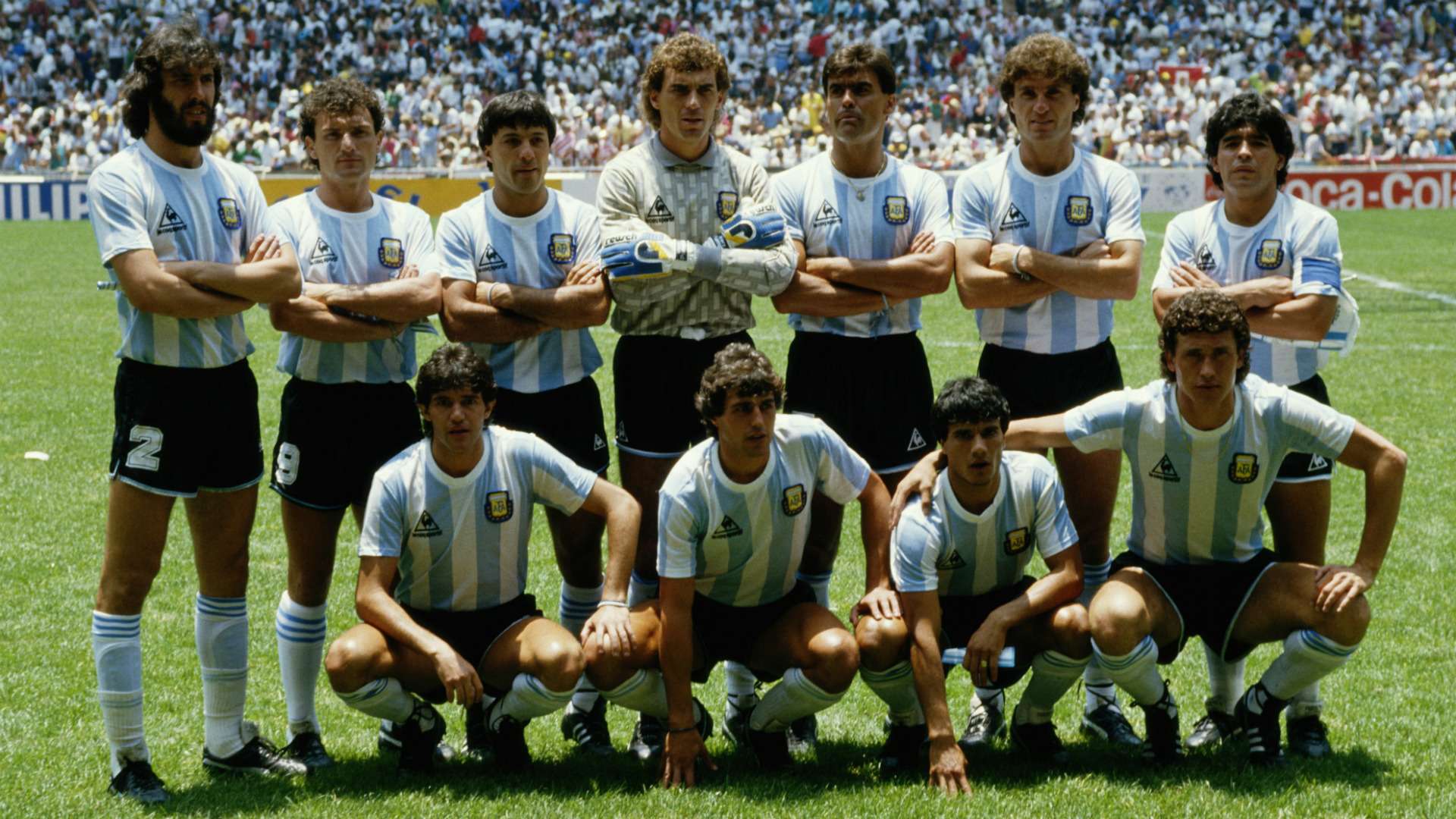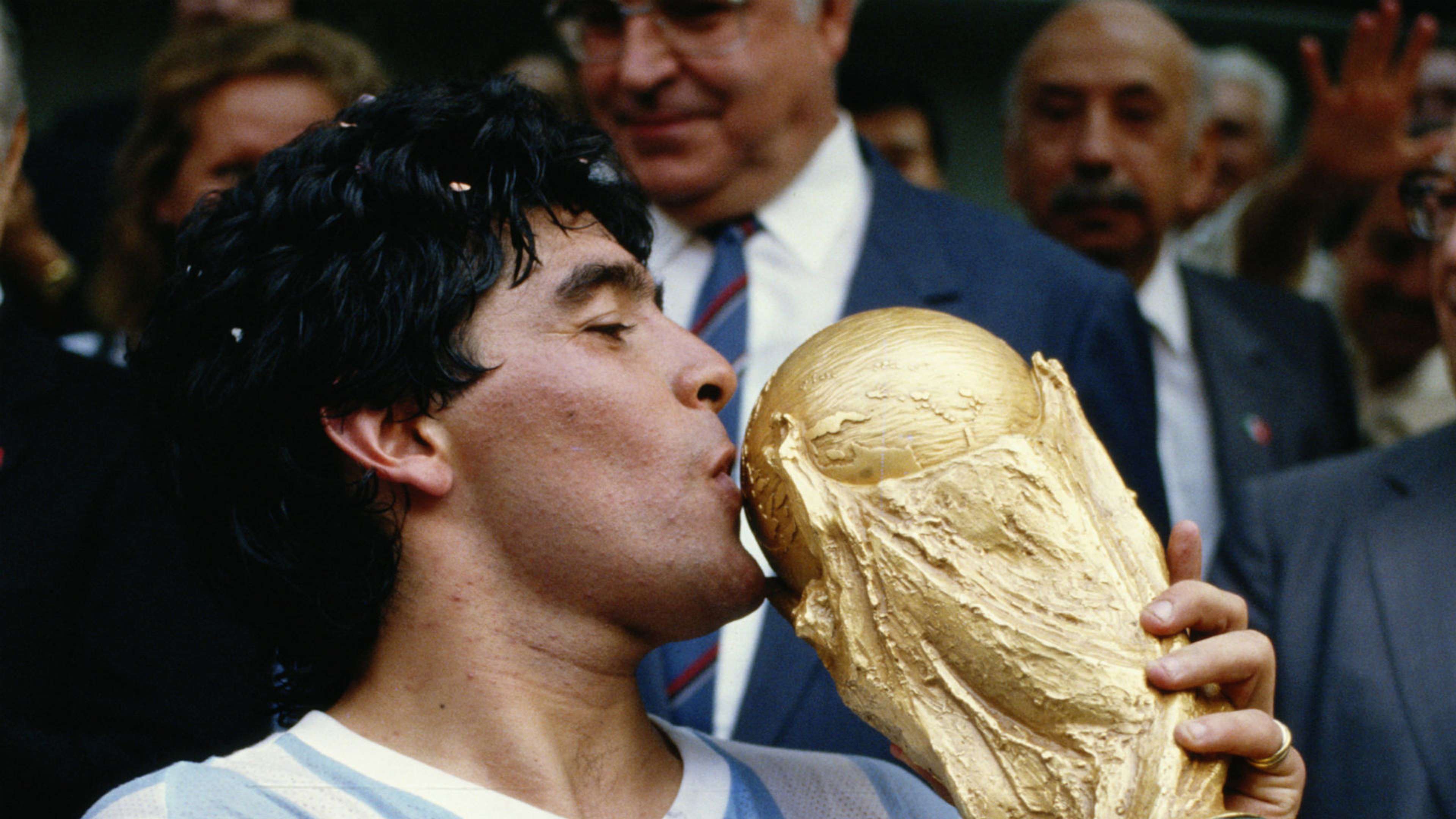After watching Lionel Messi miss a penalty in Argentina's opening group game at the 2018 World Cup, Hernan Crespo pleaded for his compatriots not to be too hard on the national team's talisman.
"Of course, we expect more from him," the former Albiceleste striker told the Gazzetta dello Sport after the 1-1 draw with Iceland.
"But Messi is not (Diego) Maradona. He cannot win the World Cup alone."
But that's a flawed argument. Maradona didn't win the World Cup on his own.
El Pibe's genius and achievements within the game have long been underestimated by younger generations – which is why it was so heartening to see the astonished reaction to Asif Kapadia's enthralling documentary on Maradona.
However, the idea that he was single-handedly responsible for Argentina’s triumph at Mexico '86 is simply wrong.
Nobody has ever dominated a major international tournament in such spectacular fashion, of course. Seventy-one per cent of Argentina's goals were either scored or assisted by Maradona at the finals, who also produced one iconic moment after another.
Indeed, in the quarter-final against England alone, 'The Hand of God' was followed just three minutes later by 'The Goal of the Century', when the No.10 picked up a pass from Hector Enrique some 60 metres from goal and proceeded to beat Peter Beardsley, Peter Reid, Terry Butcher, Terry Fenwick, Peter Shilton – and then Butcher again – before sliding the ball into an unguarded net.
Enrique famously joked afterwards, "With the pass I gave Maradona, if he hadn't scored, he'd have been killed!"
The midfielder's wonderfully ironic take on the finest individual goal of all time only strengthened the impression that Argentina were essentially a team of water-carriers and one unstoppable phenomenon.
Nothing could have been further from the truth, though.
 Getty Images
Getty ImagesArgentina may not have arrived in Mexico as one of the favourites but they boasted a stellar squad.
Nestor Clausen, Ricardo Giusti and Ricardo Bochini had been a part of the Independiente side that had conquered the Copa Libertadores and then beaten Liverpool in the Intercontinental Cup just two years previously, while midfield rock Sergio Batista and the classy Claudio Borghi helped tiny Argentinos Juniors to two Primera titles as well as their first Libertadores, in 1985.
Enrique, Nery Pumpido and Oscar Ruggeri would also lift the same two trophies with River Plate just a few months after tasting glory in Mexico.
In addition, five members of the squad were playing in Europe along with Maradona (Napoli): Daniel Passarella (Fiorentina), Pedro Pasculli (Lecce), Marcelo Trobbiani (Elche), Jorge Valdano (Real Madrid) and Jorge Burruchaga (Nantes).
As the latter told El Grafico, "We had great players." The problem was that the group was divided, "full of big personalities, jealousies, cliques."
Thus, the role of coach Carlo Bilardo in bringing the squad together is often unfairly overlooked. Indeed, if it weren't for him, the side wouldn't have been built around Maradona.
After all, the talented but temperamental attacking midfielder had been sent off in Argentina's tournament-ending loss to bitter rivals Brazil at the 1982 World Cup and he was still distrusted by many pundits and journalists.
"I remember that there were many articles criticising Diego before the World Cup," Bilardo told Marca, "because I made him captain in place of Passarella and that he shouldn't even be in the squad after what happened in Spain in '82 - let alone the starting side.
"They said that Maradona was a failure for the national team. They said to me, 'Bochini is better than Maradona.'
"I didn't respond."
He instead focused on managing Maradona, who was more determined than anyone to make the press eat their words.
Coaches often struggled to keep Maradona out of nightclubs; Bilardo's problem was keeping Maradona off the pitch.
"Diego used to get really bored while we were all cooped up together at the team's training camp," Valdano later explained to Fifa's official website. "The only way to help pass the time was by kicking a ball about.
"But Bilardo didn't want us wasting all our energy out on the training pitch, especially seeing as our base in Mexico City was at altitude. We had to make sure we saved our energy.
"Sometimes, we'd find ourselves in an unusual situation where the team wanted to play and to train but the coach wouldn't let us. Our world had been turned upside down!"
Bilardo's masterful management would pay off, though. As would his decision to ask a member of his backroom, Ruben Moschella, to buy lighter jerseys for his players for the quarter-final clash with England after they had struggled with the heat in their heavier, cotton-made second strip in the last-16 win over Uruguay.
Bilardo's biggest contribution to Argentina's triumph, though, was his tactical approach, as he embraced a 3-5-2 formation in Mexico – a system that would quickly become commonplace but was novel at the time.
It worked a treat. Not only did Argentina prove difficult to break down, with the three centre-halves wrapped up in a five-man blanket when their opponents had the ball, the formation also afforded Maradona a more advanced role effectively shorn of any defensive responsibilities.
The results were devastating. Argentina conceded just three goals in six games on their path to the final, while Maradona ran riot, earning his country a confidence-boosting draw with reigning champions Italy in the group stage before bagging doubles against both England and Belgium in the knockout stage.
 Getty
GettyMaradona's influence on his team-mates was colossal.
"Maradona was a technical leader: a guy who resolved all difficulties that may come up on the pitch," Valdano later explained to Marcela Mora y Araujo.
"Firstly, he was in charge of making the miracles happen, that's something that gives team-mates a lot of confidence. Secondly, the scope of his celebrity was such that he absorbed all the pressures on behalf of his team-mates.
"What I mean is: one slept soundly the night before a game not just because you knew you were playing next to Diego and Diego did things no other player in the world could do, but also because unconsciously we knew that if it was the case that we lost, then Maradona would shoulder more of the burden, would be blamed more, than the rest of us."
In that sense, it's easy to understand why so many feel that Argentina would not have won that tournament with anyone other than Maradona in the No.10 jersey.
"I love Messi and I would be happy if my son would play at one per cent of his abilities but Maradona was unique," Enrique told Continental.
"Maradona and Messi have different characters on the pitch. Diego radiated confidence and made all of us play better."
And that is the key here: Maradona was integral to everything Argentina did in Mexico but they would not have triumphed had so many of his team-mates not stepped up to the mark.
"I have always said, ‘Thank God Diego is Argentine!'" Burruchaga told El Grafico. "We always knew what he meant for us. But we all helped Diego do what he did.
"We should not forget we had an extraordinary team, that overcame tough times with the maturity needed to get over our problems and do whatever it took for the shirt."
And he's not wrong.
 David Cannon/Getty Images
David Cannon/Getty ImagesEnrique forced his way into the starting line-up in the knockout stage and – along with Sergio Batista and Burruchaga in midfield – provided Maradona with the perfect platform on which to work his magic.
Burruchaga also provided a formidable attacking threat from midfield, as he so famously underlined by surging through the West Germany midfield in the dying minutes of an energy-sapping final in Mexico City to score the winning goal.
Pumpido was excellent in goal and protected by a tremendous three-man backline of Ruggeri, Jose Luis Brown and Jose Luis Cuciuffo, with Giusti and Julio Olarticoechea playing the wing-back roles to perfection.
Meanwhile, Valdano – like so many of his team-mates – had the summer of his life. He scored seven times for his country in total; four of those goals arrived in Mexico.
It was Valdano who also subsequently revealed that Maradona had told him after the game that he had repeatedly looked up to see if he could pass him the ball during his stunning solo strike against England.
It was a remarkable admission and one that underlined Maradona's awareness and appreciation of his team-mates. He achieved a level of individual excellence at the World Cup that may never be seen again – but he couldn't have done so without them.
Indeed, when he had his moment of self-doubt after West Germany had scored two quick goals to draw level in the final, Burruchaga told his visibly frustrated captain, "Calm down, we're going to go on and win this."
Inspiration was also taken from Brown, the centre-half Bilardo considered his "on-pitch manager" and who Maradona called "a bull" for playing through the pain throughout the tournament.
Brown had barely played during the previous two years due to ligament damage and his knee would swell up so badly during the World Cup that it had to be drained on a regular basis.
Even when he dislocated his shoulder early in the second half of the final, he refused to give in, spending just 28 seconds on the sidelines.
"The pain was unbearable, but I told the doctor in no uncertain terms, 'Don’t even think about taking me off!' Brown later revealed.
"I bit a hole in my jersey, put my finger through it, and used it as a sling."
Such self-sacrifice should never be forgotten or overlooked.
Maradona was the undoubted star of the show at the 1986 World Cup. But to say that he won it alone does a disservice to an incredible supporting cast.
